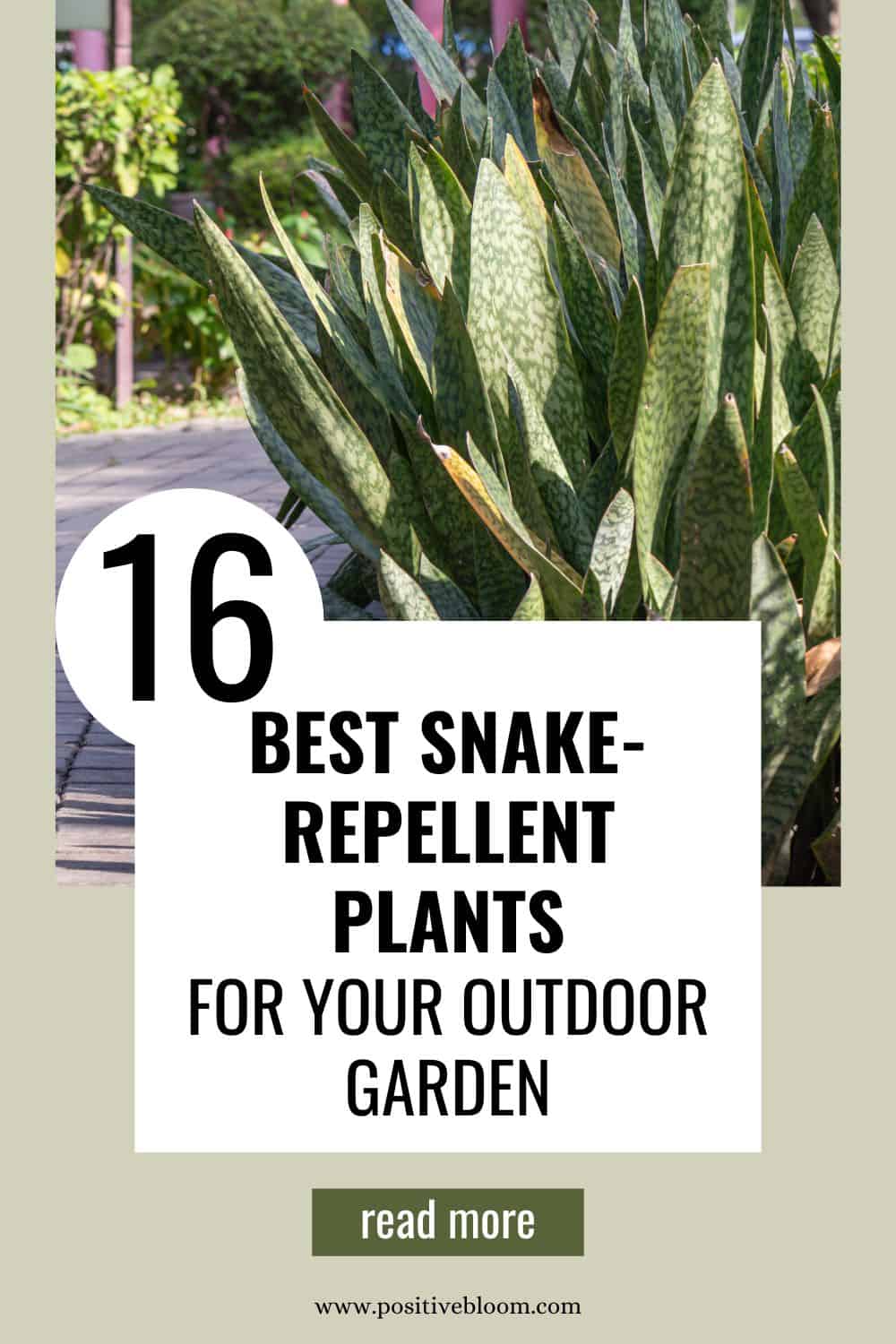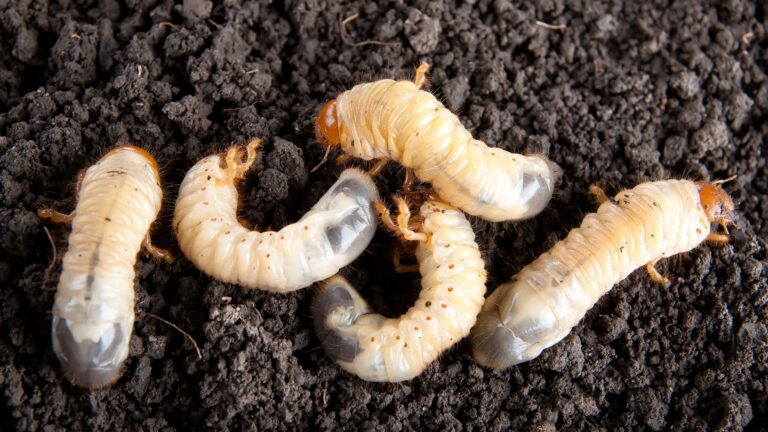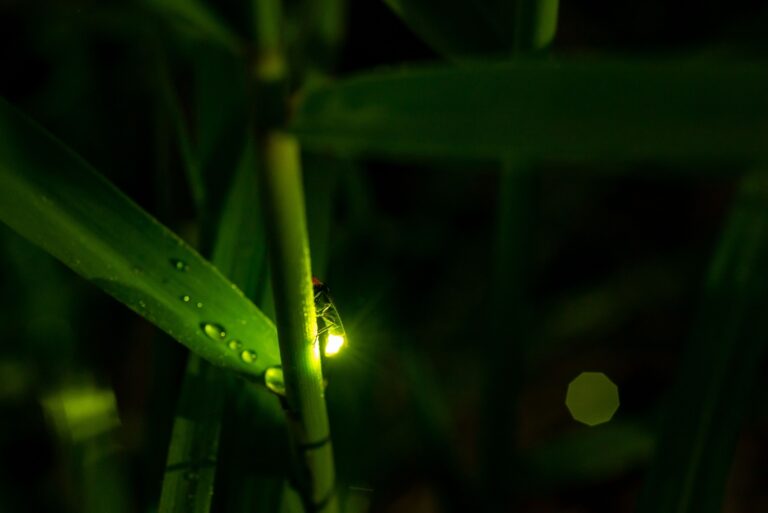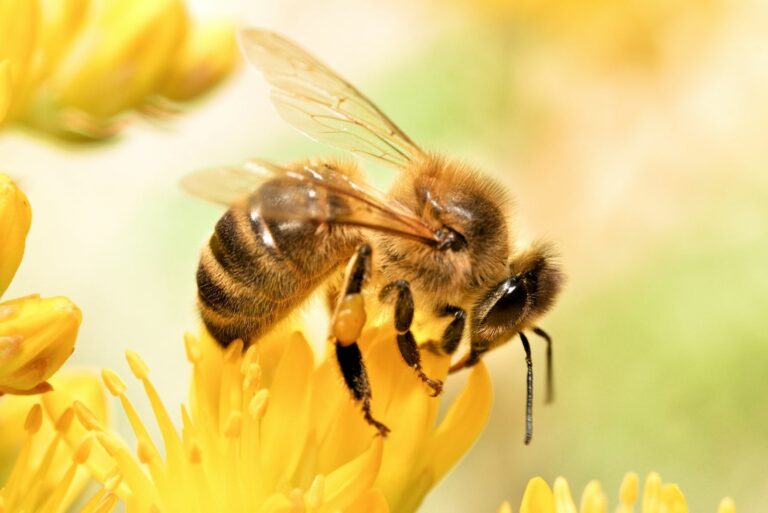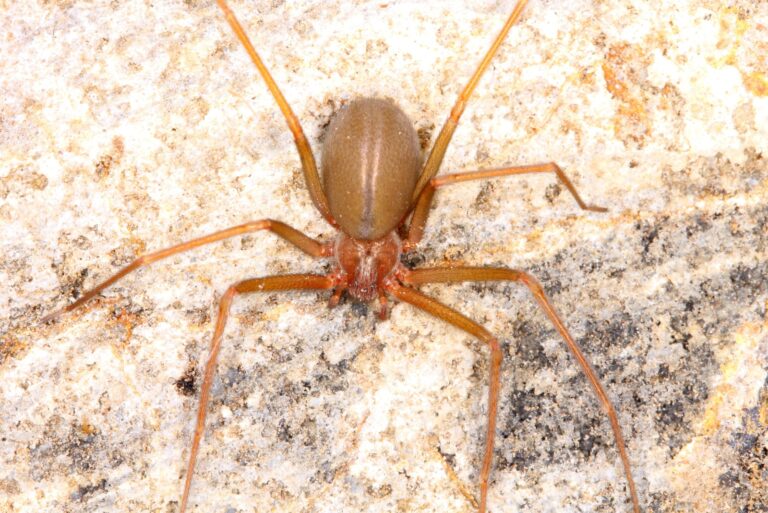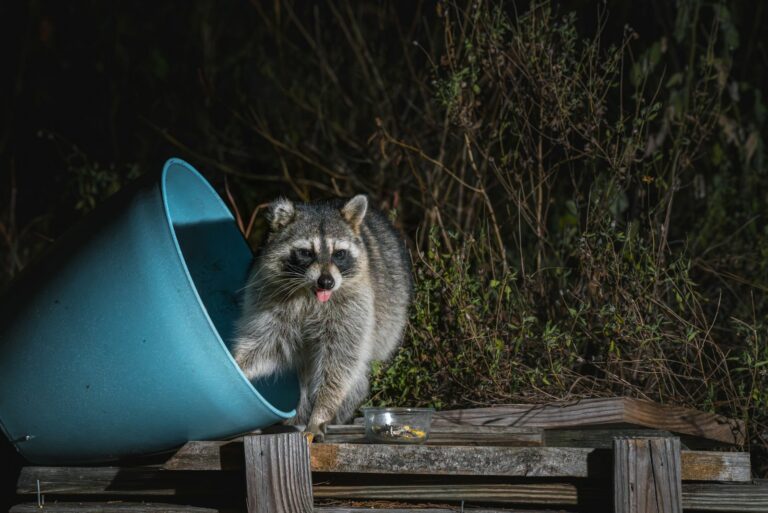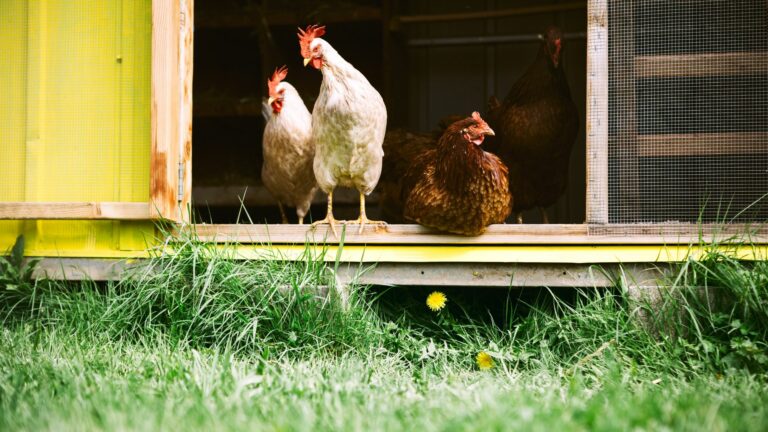Grow These 16 Snake-Repellent Plants To Keep The Snakes From Slithering Around In Your Yard
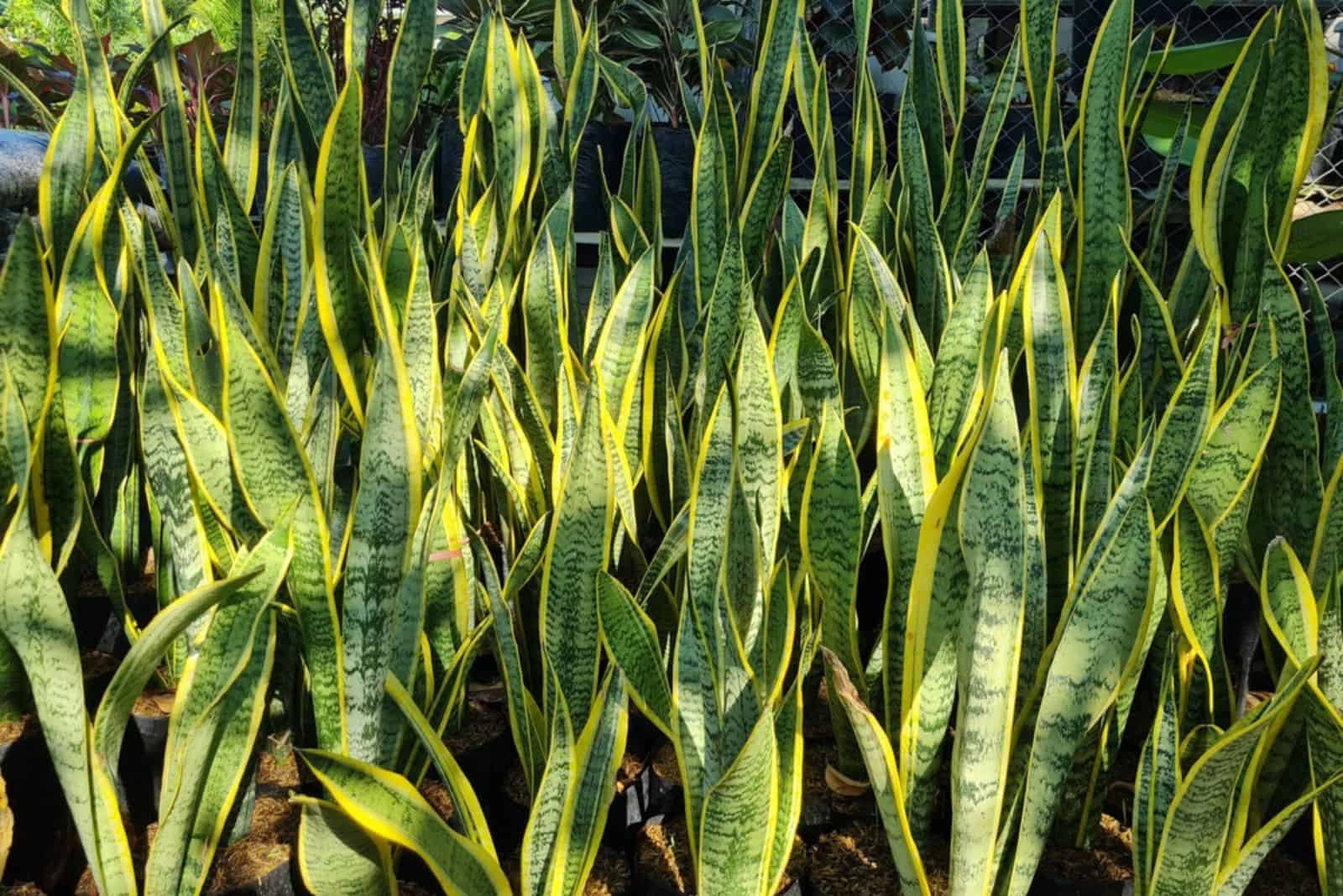
I’ve heard about snakes and their importance to the ecosystem so many times that I should be less scared of them by now.
Well, that’s not the case! One thing is for certain; I don’t want these animals in my yard! The very thought of snake bites makes me dizzy and uncomfortable.
Luckily, there are some humane ways to repel snakes.
Gardening is my area of expertise, so I’ll show you a list of 16 snake-repellent plants that deter these animals and keep them at bay.
You’ll discover more about the characteristics of these plant species and why snakes hate them.
Let’s get started!
1. Marigolds
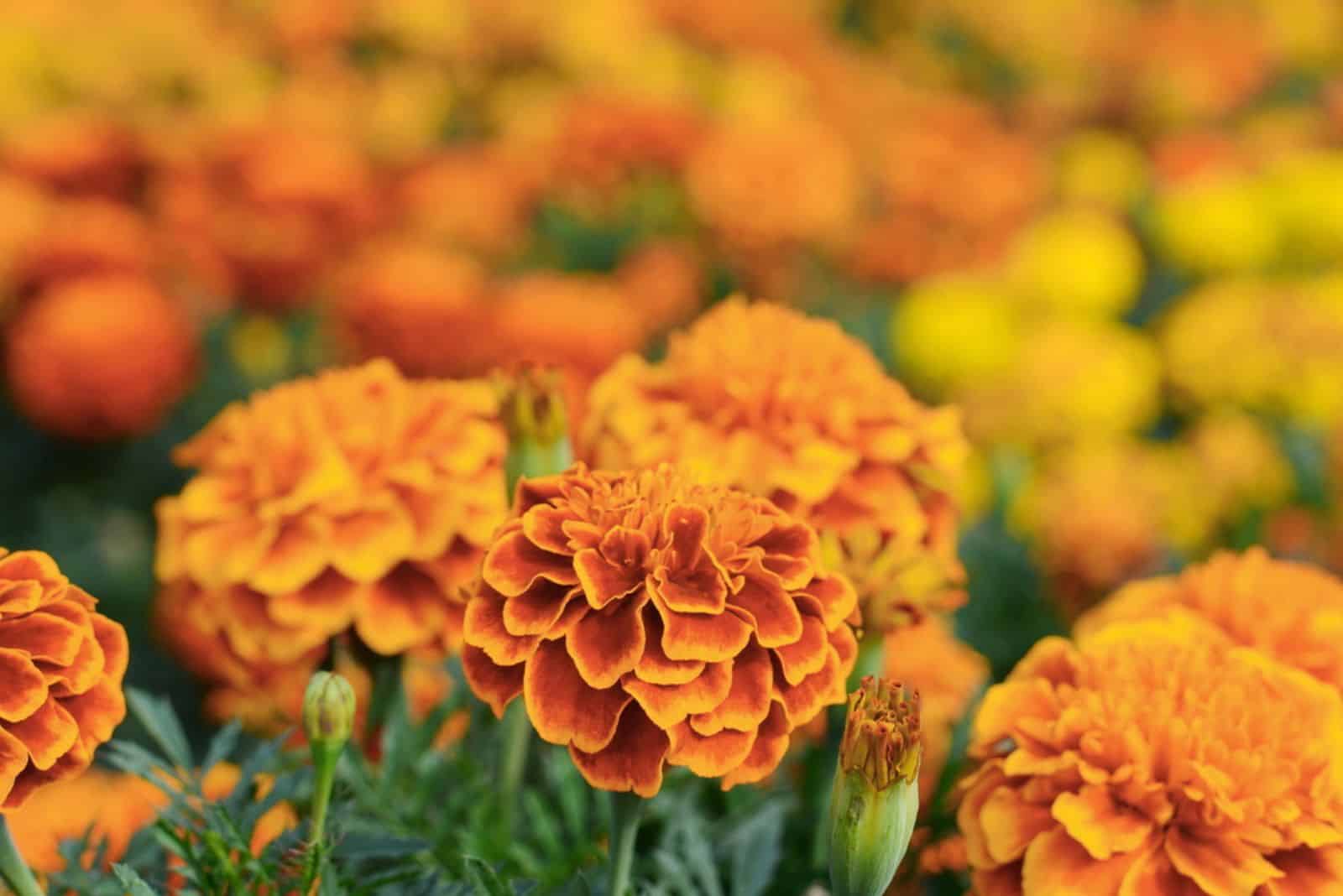
Marigolds are great low-maintenance plants that’ll repel snakes due to their strong scent.
Here’s some basic info about marigolds.
[table id=546 /]
No matter if you grow French or American marigolds, I’m sure you’ve noticed the strong odor these plants have.
And that’s actually the reason why snakes are afraid of marigolds. Contrary to popular belief, marigold flowers aren’t the only ones to emit strong scents.
This plant species features deep and robust roots whose scent repels other animals, such as moles and gophers.
Marigolds will repel garden pests and attract beneficial pollinators. These excellent carrot companion plants thrive in full sun and need moist soil.
2. Wormwood (Mugwort)
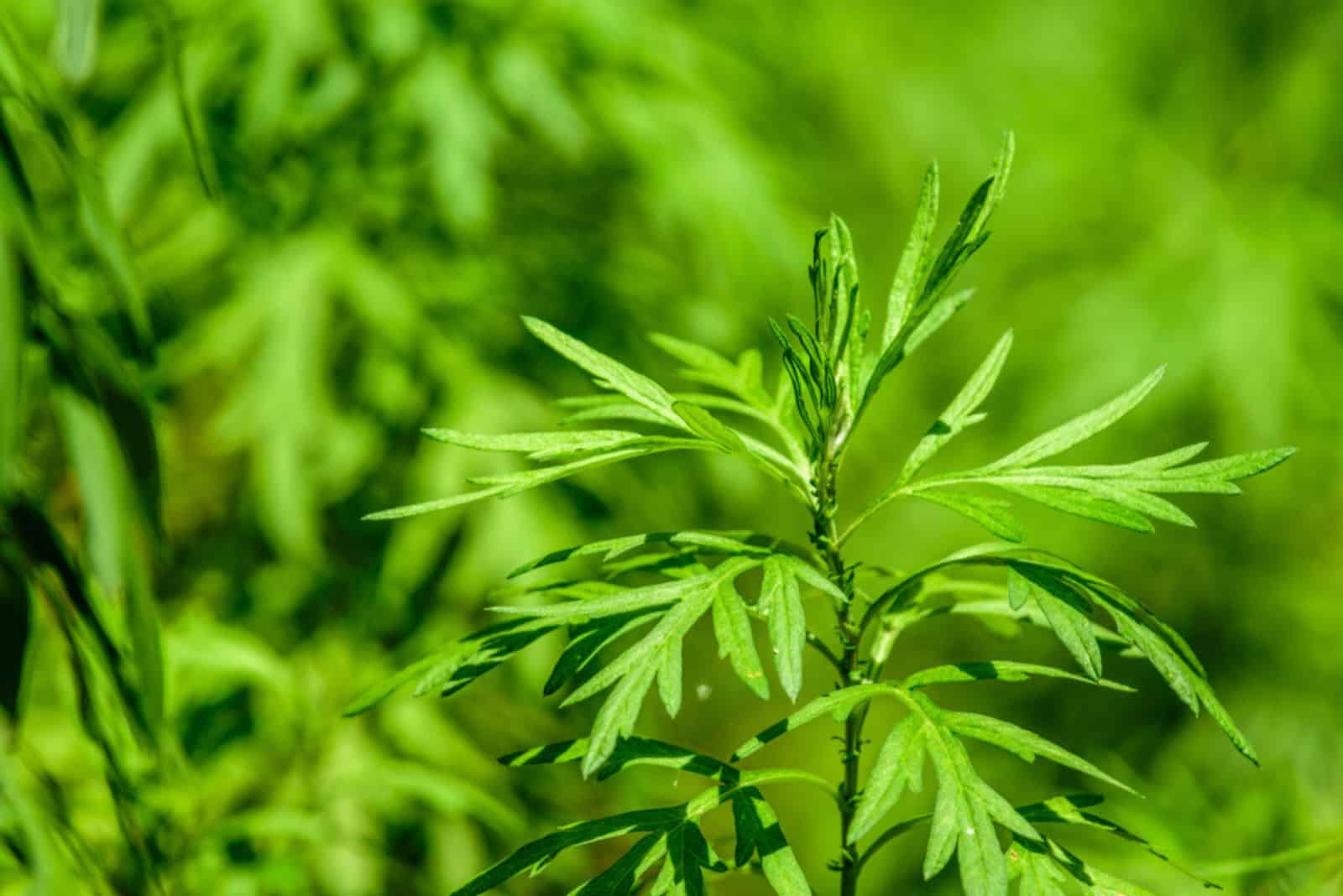
Scientifically known as Artemisia vulgaris, wormwood is another eye-catching plant species that will keep snakes away from your property.
Here’s some basic info about wormwood.
[table id=547 /]
Many people cultivate mugwort plants due to their eye-catching silverish leaves, and some make fermented plant juice, but did you know snakes hate these plants?
Strong smells of wormwood will deter snakes, so growing these plants as borders is an excellent idea.
Full sun and well-draining soil will ensure the healthy growth of mugwort plants.
3. West Indian Lemongrass
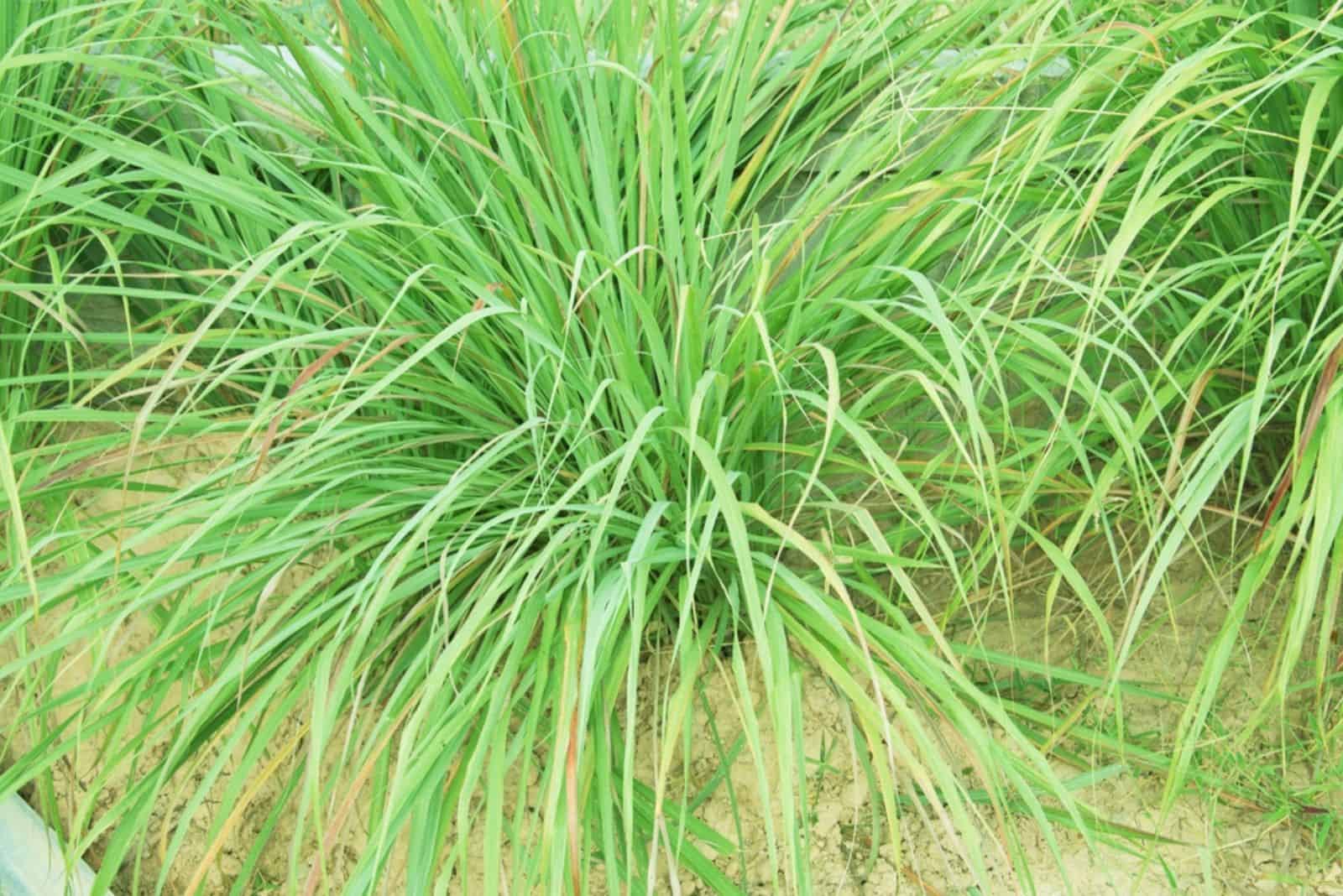
Lemon grass belongs to the grass family and is an excellent snake deterrent. It’s native to Sri Lanka, so you can cultivate it outdoors year-round if you live in warm climates.
Let’s start with some basic info about the Cymbopogon citratus aka West Indian lemongrass.
[table id=548 /]
Lemongrass will make an excellent addition to your outdoor garden. First, it looks beautiful and it’s pretty easy to maintain.
Second, it will keep snakes at bay and is also a great lizard-repellent plant.
You’ll need to ensure a nutrient-rich and well-draining soil for your lemongrass and provide it with at least 6 hours of direct sunlight daily.
4. Society Garlic
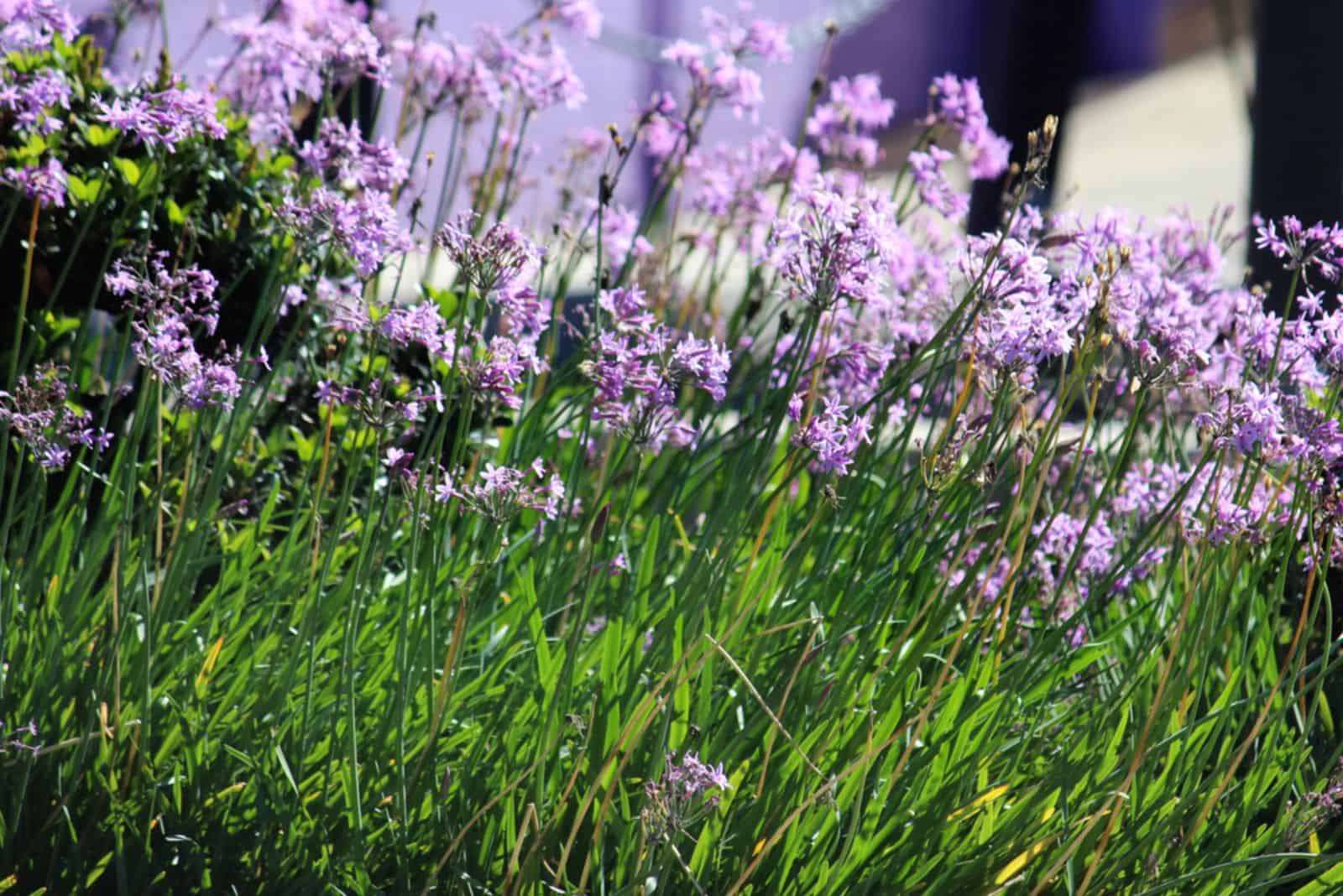
Another effective snake repellent is a plant with a pretty uncommon name, society garlic. Interestingly, this species has nothing to do with onions and garlic we commonly grow in our garden.
Here’s some basic info about society garlic.
[table id=549 /]
This plant variety belongs to the Tulbaghia genus and is known for its unique star-shaped purple blossoms.
It’s a perfect plant for mass planting, and the fact that it’ll keep snakes at bay makes it even more desirable.
The plant got the nickname “society garlic” as it’s believed that it has the same taste as garlic, but without the accompanying bad breath!
The stems and flowers emit a strong scent that snakes aren’t fond of.
The plant is hardy in USDA zones 7 through 10 and needs a lot of light. Its watering needs are low.
5. Mother-in-law’s Tongue

I’m sure you expected to find a snake plant on this list. Also known as Sansevieria trifasciata, mother-in-law’s tongue is an effective deterrent in the battle with snakes.
Here’s some basic info about the Dracaena trifasciata aka mother-in-law’s tongue plant.
[table id=550 /]
Snake plants have sharp leaf tips, so snakes will run away after spotting them. Due to the temperature tolerance of snake plants, they can be grown outdoors in warm climates only.
Many grow snake plants due to their oxygen-supplying features. You’ll need to find a spot for your Dracaena trifasciata that’s not exposed to full sun because the leaves are delicate and could quickly scorch.
Also make sure the roots of your snake plants don’t sit in soggy soil, as they’re susceptible to root rot.
6. Skunk Cabbage
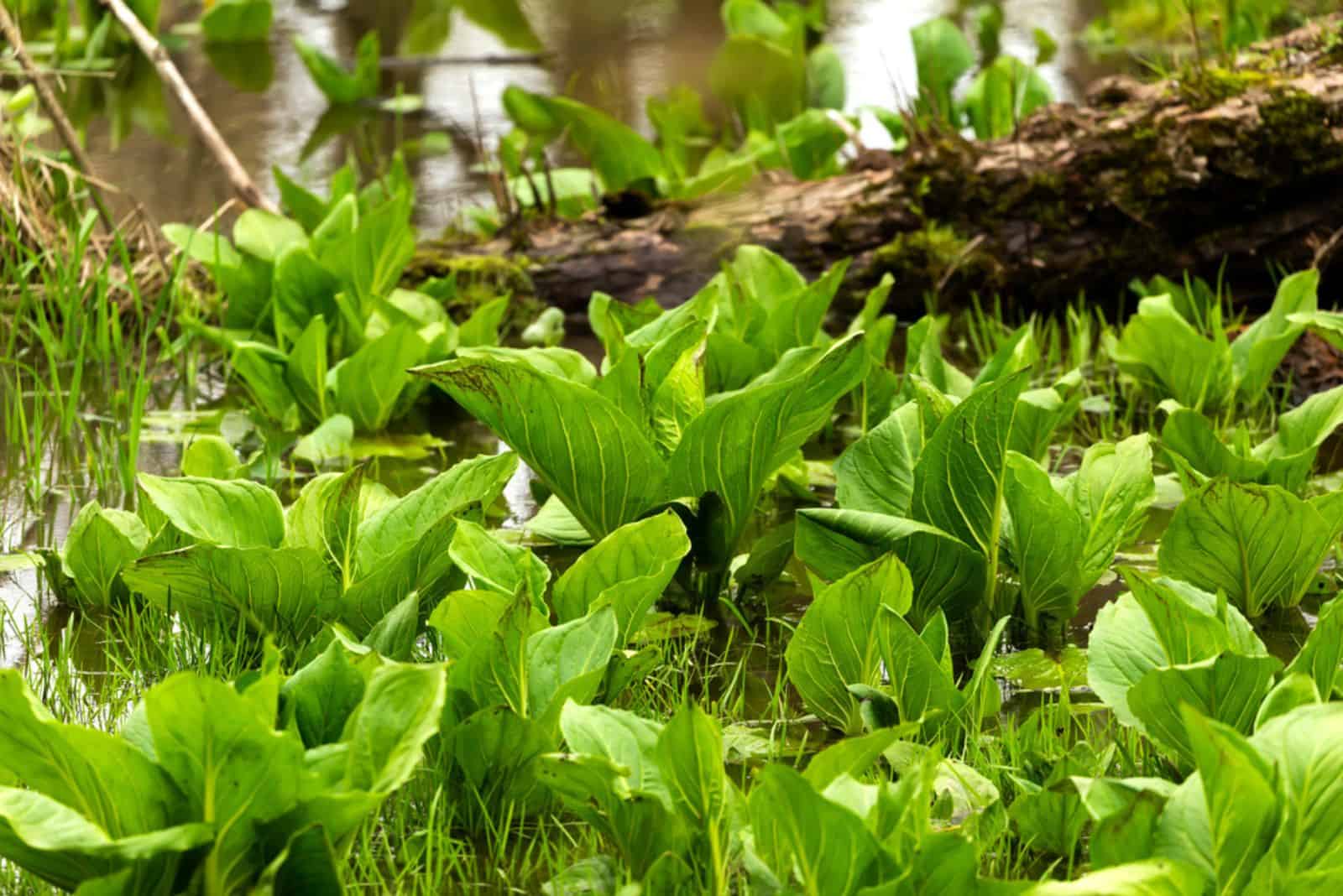
Skunk cabbage is one more plant that’ll help you repel snakes from your property. If you thought this was a plant from the cabbage family, you’re wrong. It’s a flowering plant with pretty uncommon blossoms.
Here are some essential features of the skunk cabbage plant.
[table id=551 /]
The skunk cabbage plant will help deter snakes and other critters as it emits a strong odor that interferes with their sense of smell.
Although it doesn’t produce any fruits and isn’t related to ‘real’ cabbage, the skunk cabbage will make an attractive addition to your outdoor garden.
There’s one essential thing to pay attention to; skunk cabbage develops robust and deep roots that are pretty hard to eliminate.
7. King Of Bitters
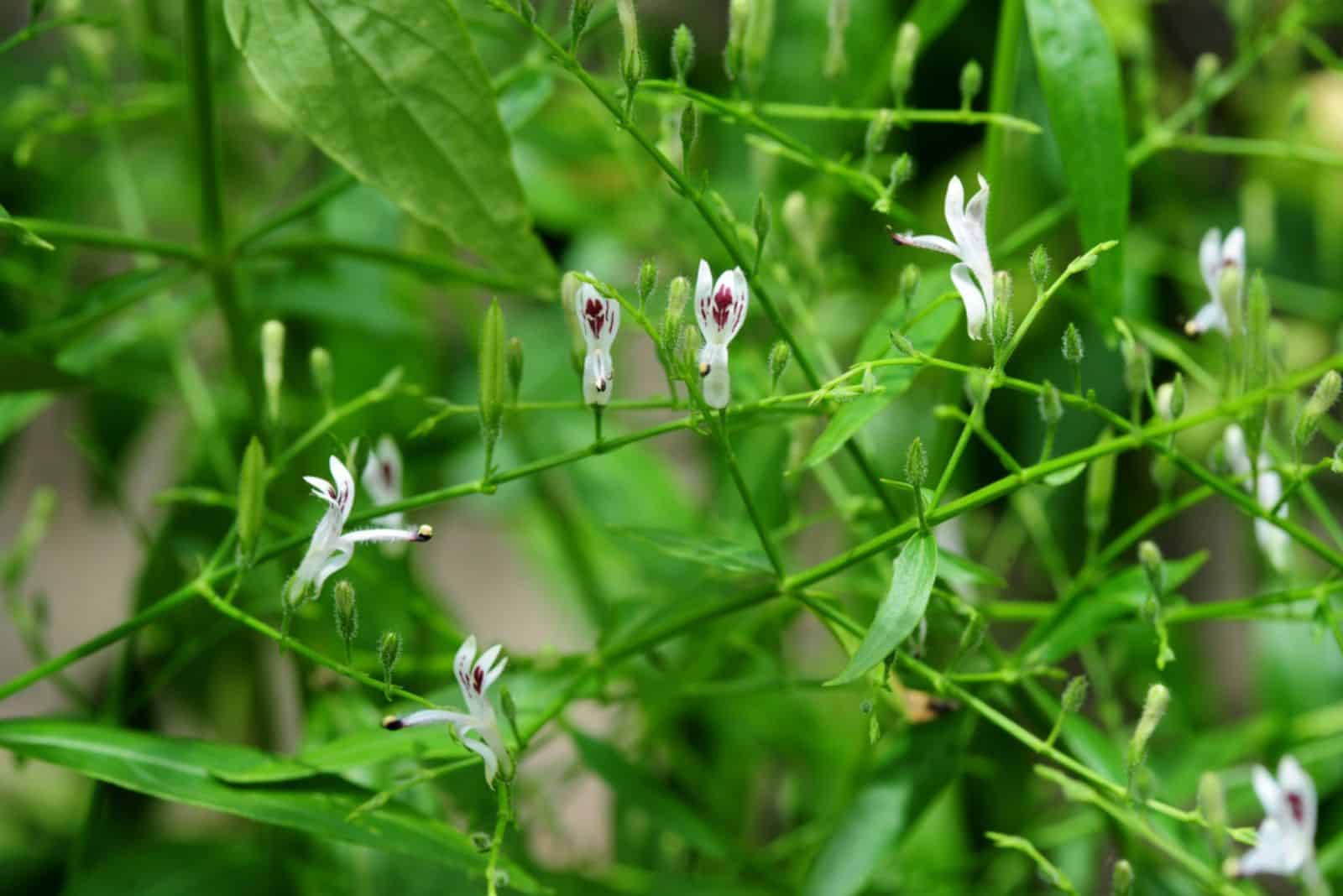
All hail to the king of bitters plant! It’s an effective snake repellent and has many other benefits.
Let’s first see some basic info about the king of bitters plant.
[table id=552 /]
This plant from the Acanthaceae family can survive in a wide range of habitats, making it suitable for many spots in our outdoor garden.
You’ll also notice magnificent pink flowers that typically develop from September to December.
The Andrographis paniculata plant contains substances with anti-venom characteristics, and is also a physical deterrent for snakes. This feature made this plant a part of alternative medicine for treating conditions such as cold, influenza, and jaundice.
8. Indian Snakeroot
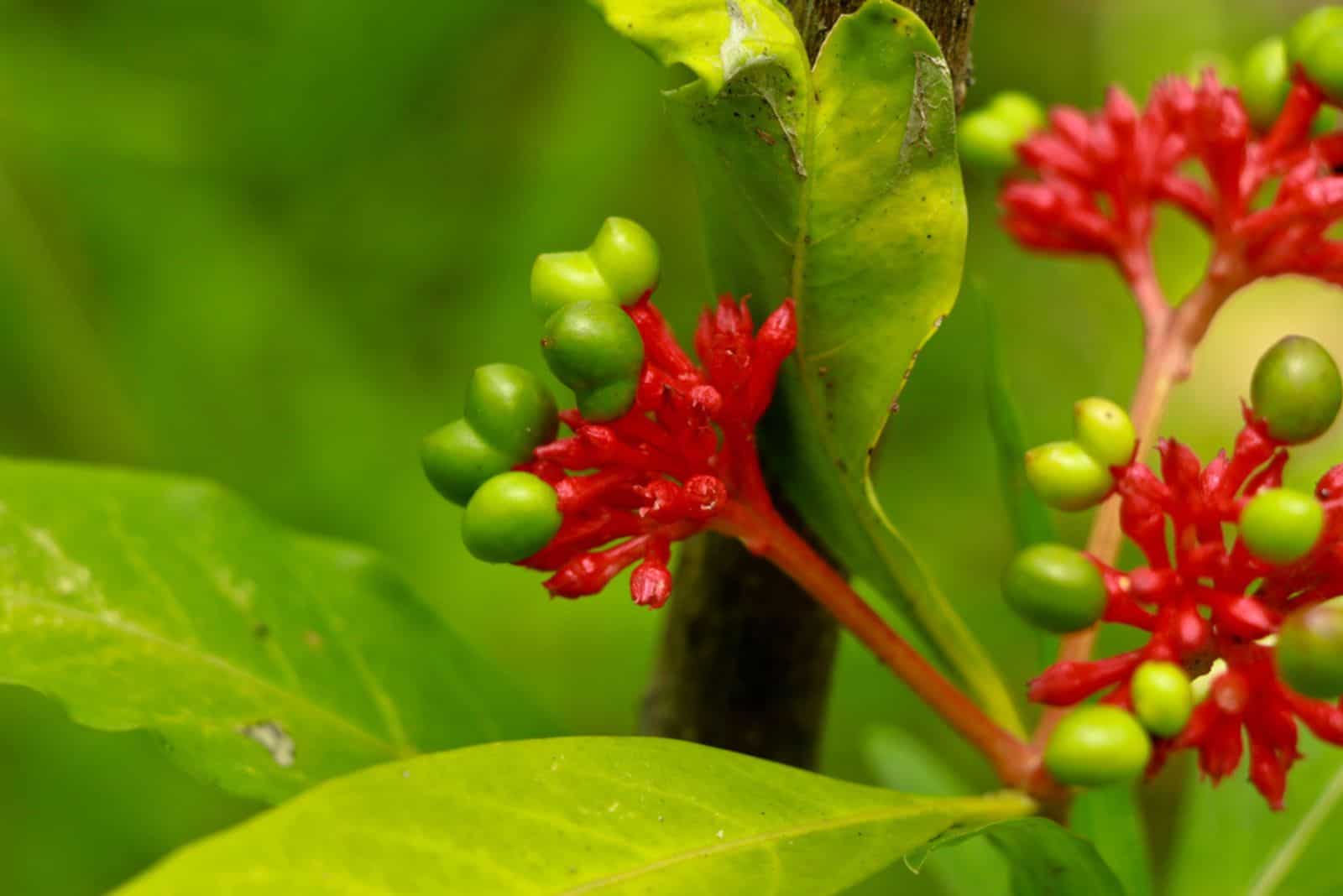
Another plant with the term snake in its name is the Rauvolfia serpentina aka Indian snakeroot plant. It’s, as you might have expected, another plant that’ll aid in keeping snakes at bay.
Let’s see some basic info about the Indian snakeroot plant.
[table id=553 /]
The juices from the devil pepper plant can counteract snake poison. The plant parts contain phytochemicals that are said to be able to treat a variety of neurological disorders.
Most of the active components found in the serpentine wood plant are actually alkaloids. Devil pepper extract is mostly utilized as a tranquilizer or antipsychotic because of its sedative and inhibitory properties.
You can enjoy the white flowers of the serpentine wood in early spring.
9. Kaffir Limes
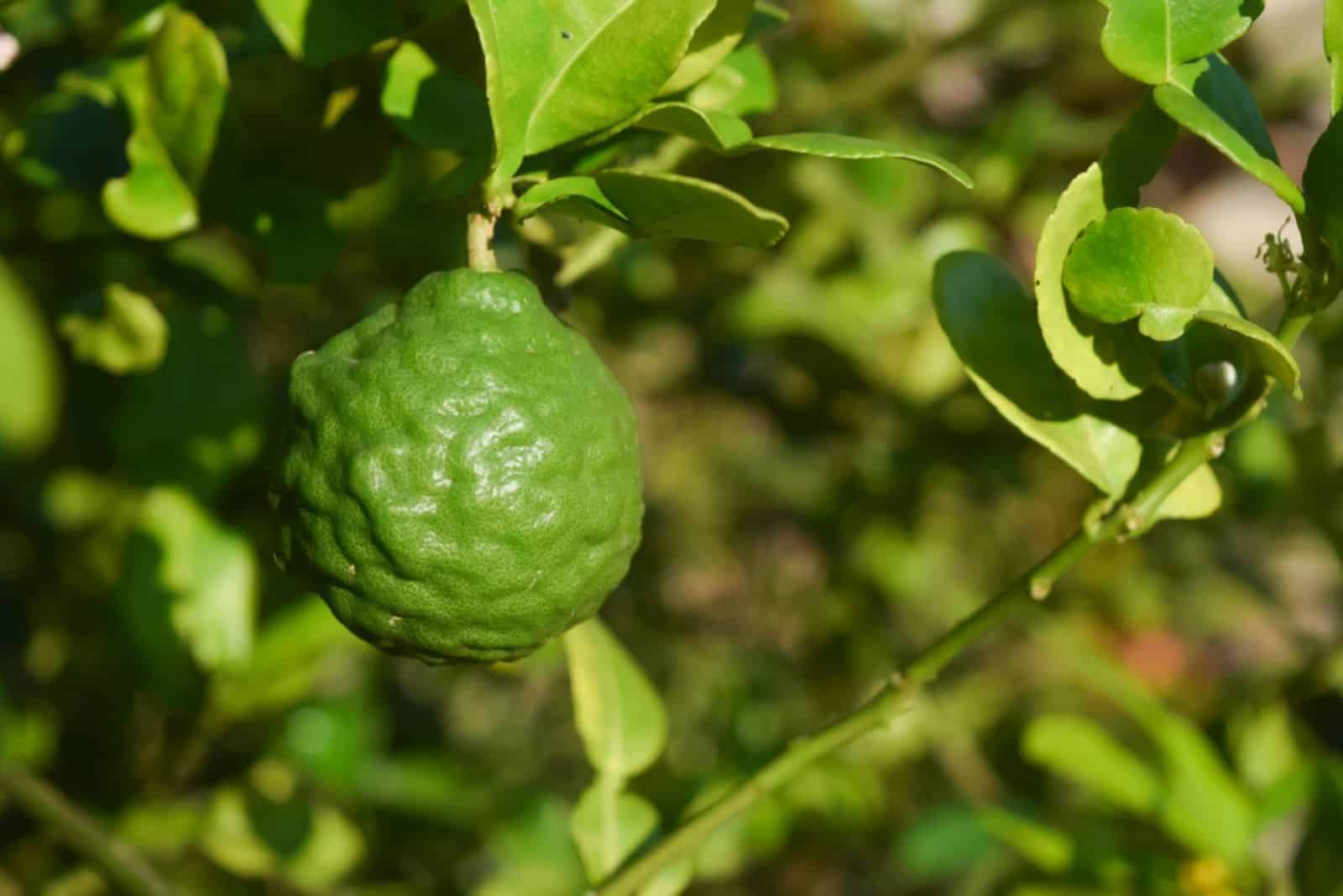
Many know the kaffir limes plant for its rough fruits. They have a peculiar smell that is comparable to that of some other citrus plants. Surprisingly, the leaves of the kaffir limes plant are used more than the fruit itself.
Once the leaves are crushed, they release a potent scent that serves well as a snake deterrent.
Here’s some basic info about the kaffir lime plant.
[table id=554 /]
This plant isn’t only used as a pest deterrent. You’ll frequently find the Citrus hystrix plant in essential oils, and some even use it for cooking.
Its odor deters snakes and many other animals, as do its prickly stalks and branches. The leaves are also the primary source of nutrition for some insects, primarily the Atlas moth.
You’ll need to find a sunny spot for your makrut lime and keep its soil constantly moist.
10. Holly
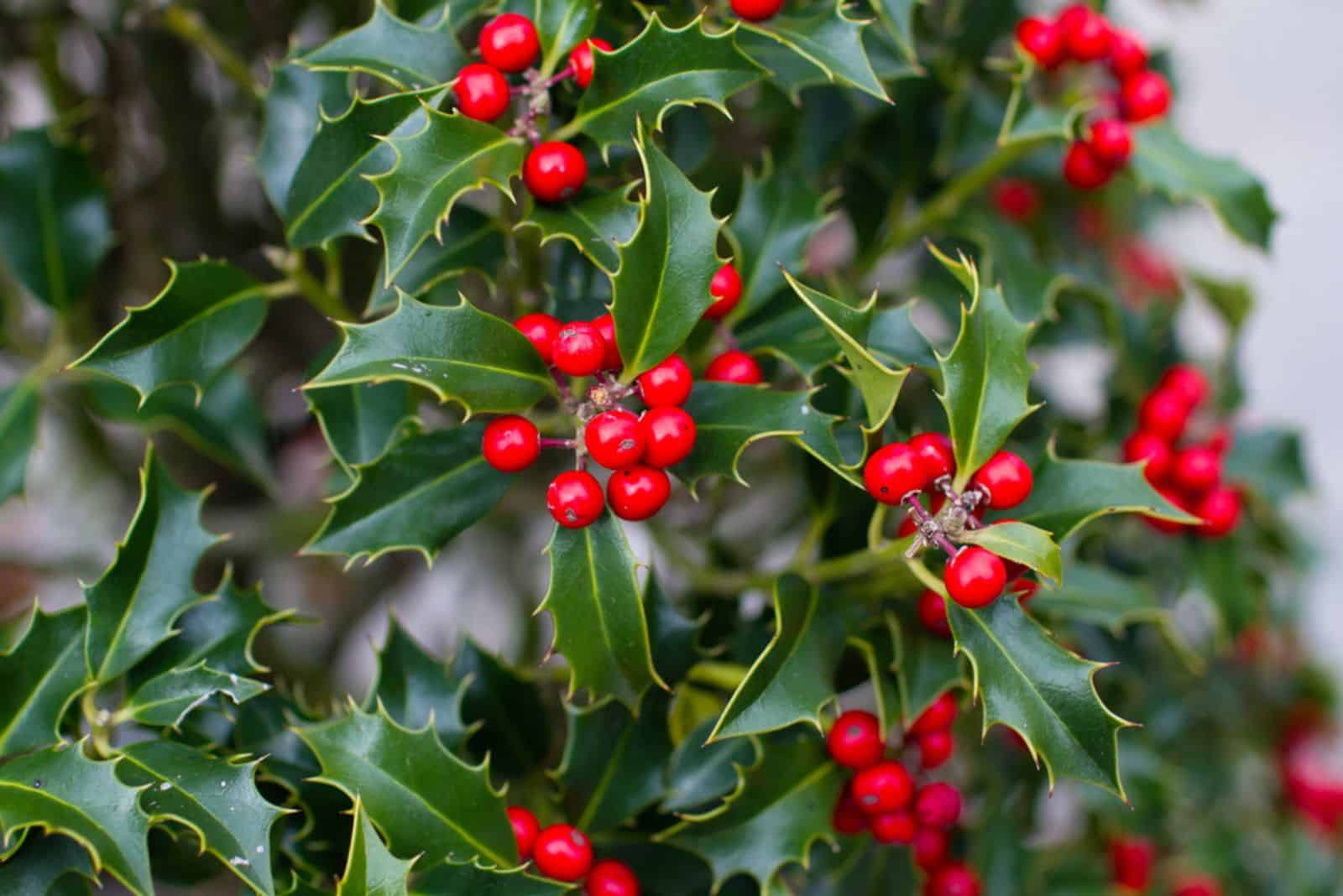
Everyone loves holly during Christmas! Interestingly, this holiday plant can also help you repel animals like snakes.
Here’s some basic info about the holly plant.
[table id=555 /]
So, do you have holly or mistletoe? If you grow a holly plant, it’ll help you deter scary snakes with its spiky leaves.
The great thing about the holly plant is that it can grow well in cool climates.
You’ll need to ensure nutrients and moist soil for your holly, but remember that this is a plant that can’t grow in mushroom compost.
11. Yellow Alder
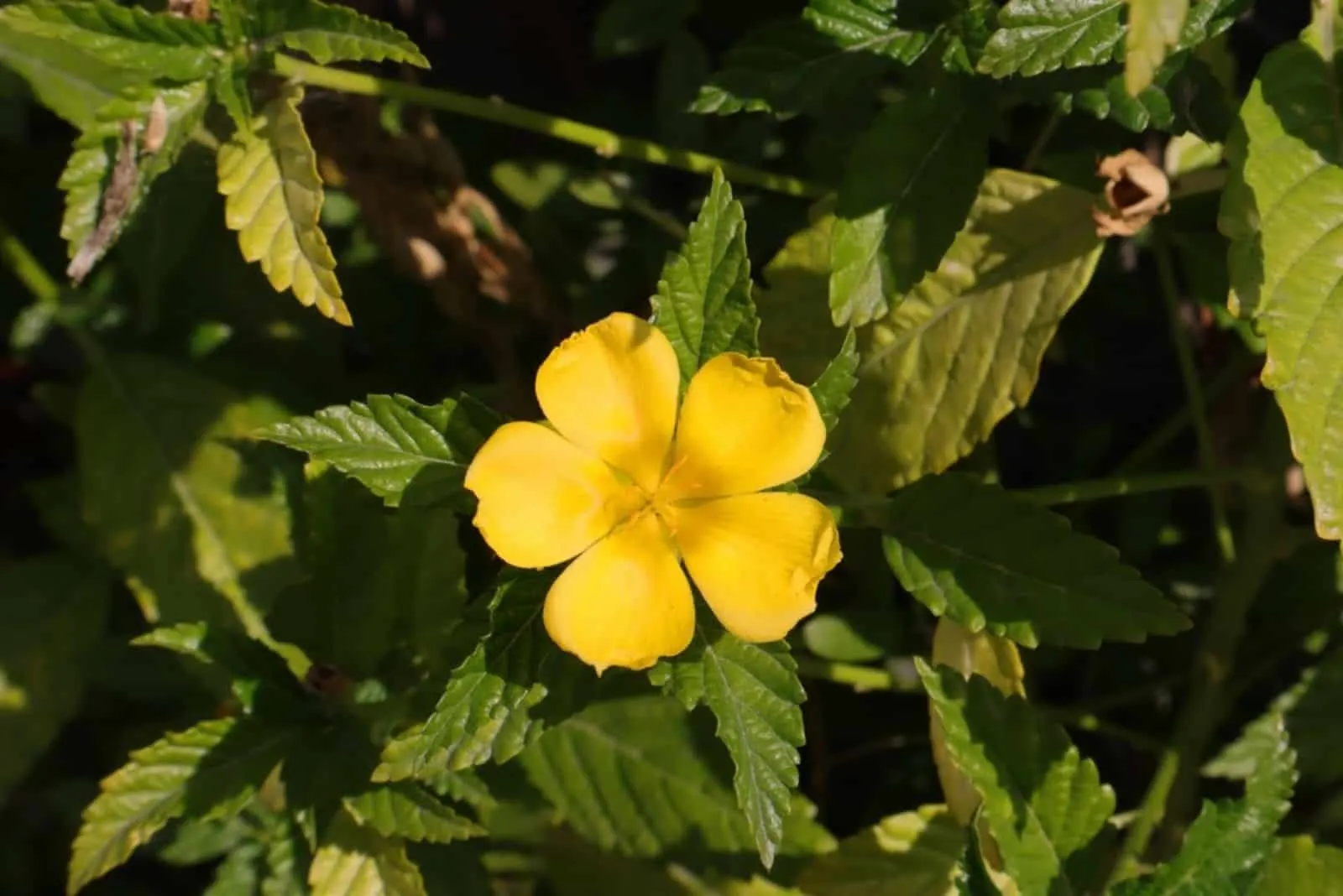
The yellow alder plant features oval-shaped green leaves that emit a strong scent when crushed. This is the primary reason the Turnera ulmifolia plant is used to deter snakes.
[table id=557 /]
What I really like about this evergreen shrub are the lovely yellow flowers, which look great when grown as a border plant.
Yellow alder is a pretty hardy plant. Still, I recommend growing it in a container and taking it indoors to overwinter.
12. Clove Basil
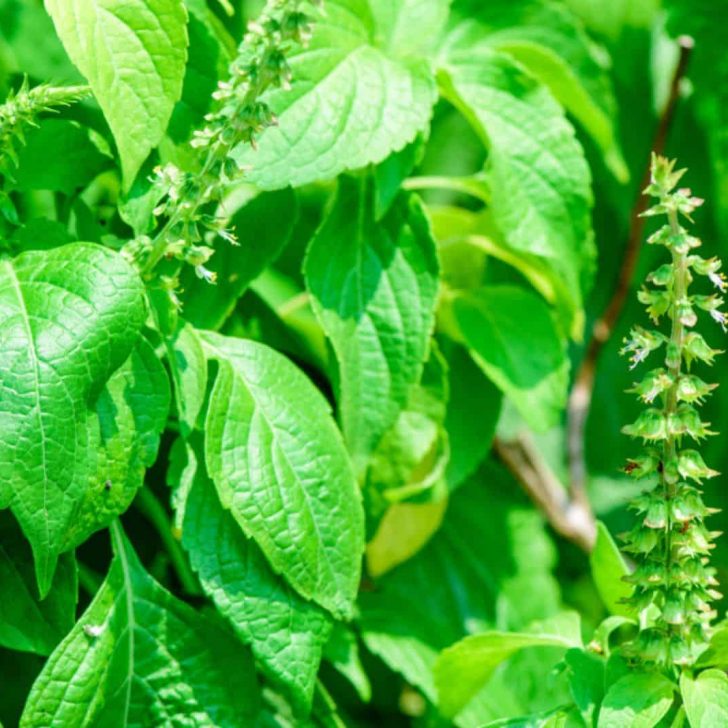
Snakes can’t withstand the smell of clove basil plants. Other basil species do have a strong scent, but clove basil definitely stands out.
Here’s some basic info about this Ocimum plant.
[table id=558 /]
Clove basil belongs to the Ocimum genus in the Lamiaceae (mint) family. You can make an excellent hedge with this basil plant. It can be grown as a perennial plant in USDA hardiness zone 12.
For other zones, Ocimum gratissimum will grow as an annual.
The strong smell will repel snakes, and the purplish-green leaves will make your garden prettier.
13. Chives
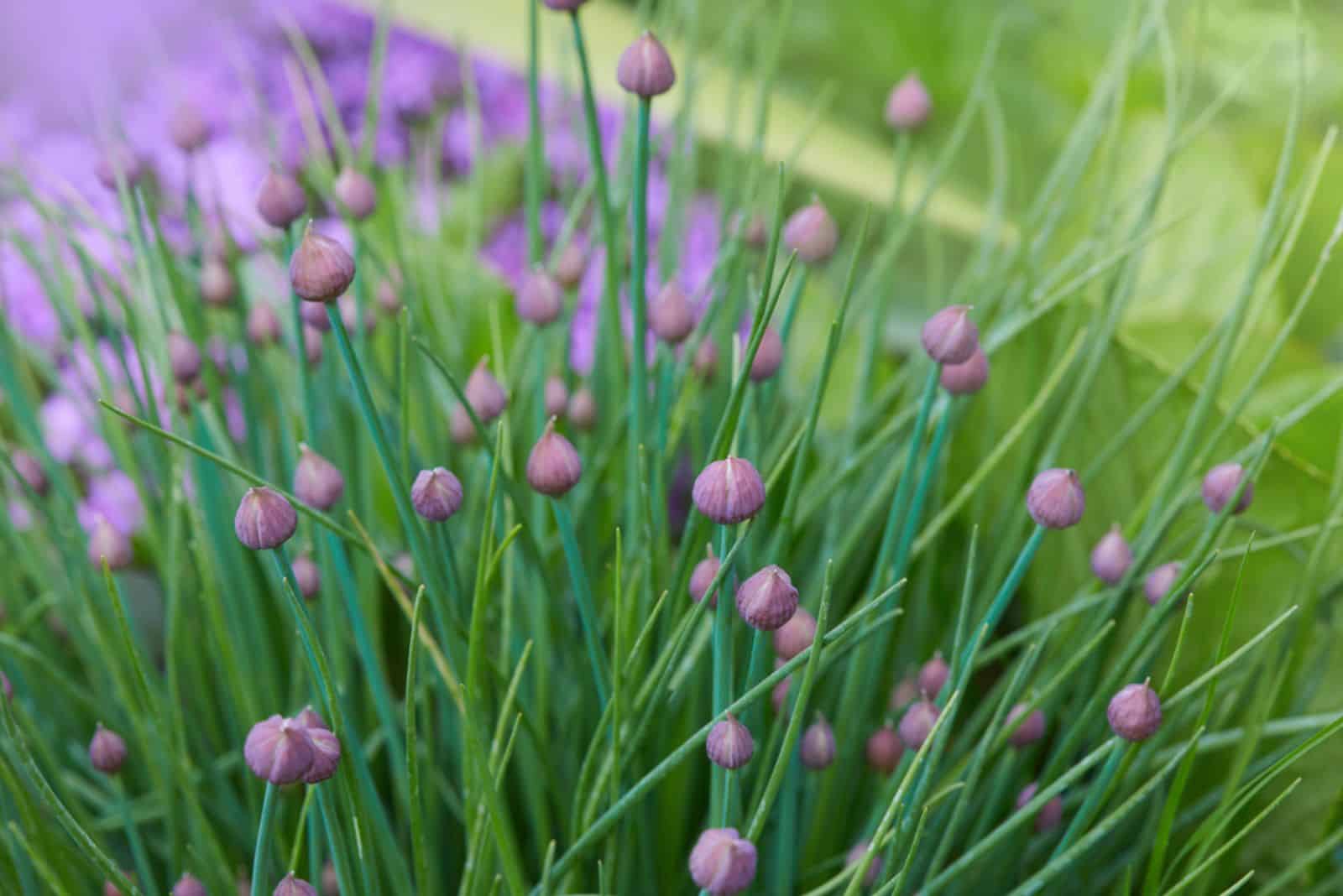
If you were looking for a cold-hardy and snake-repellent plant, then chives are an excellent choice. Just like its cousins onion and garlic, chives possess a strong scent that’ll deter many pests, including snakes.
Here’s some basic info about this Allium plant.
[table id=559 /]
I especially like chives because of their low care requirements. Although many people dislike the smell of onion and its cousins, it reminds me of some of the best dishes I’ve ever eaten.
If you need plants that will attract beneficial pollinators, such as bees, chives will step in and quickly solve the problem.
Chives are also an excellent herb for container gardening. It will thrive in partial shade and nutrient-rich soil types. Chives will survive pretty harsh winters in cool climates, so nothing can stop you from growing them!
14. Onion
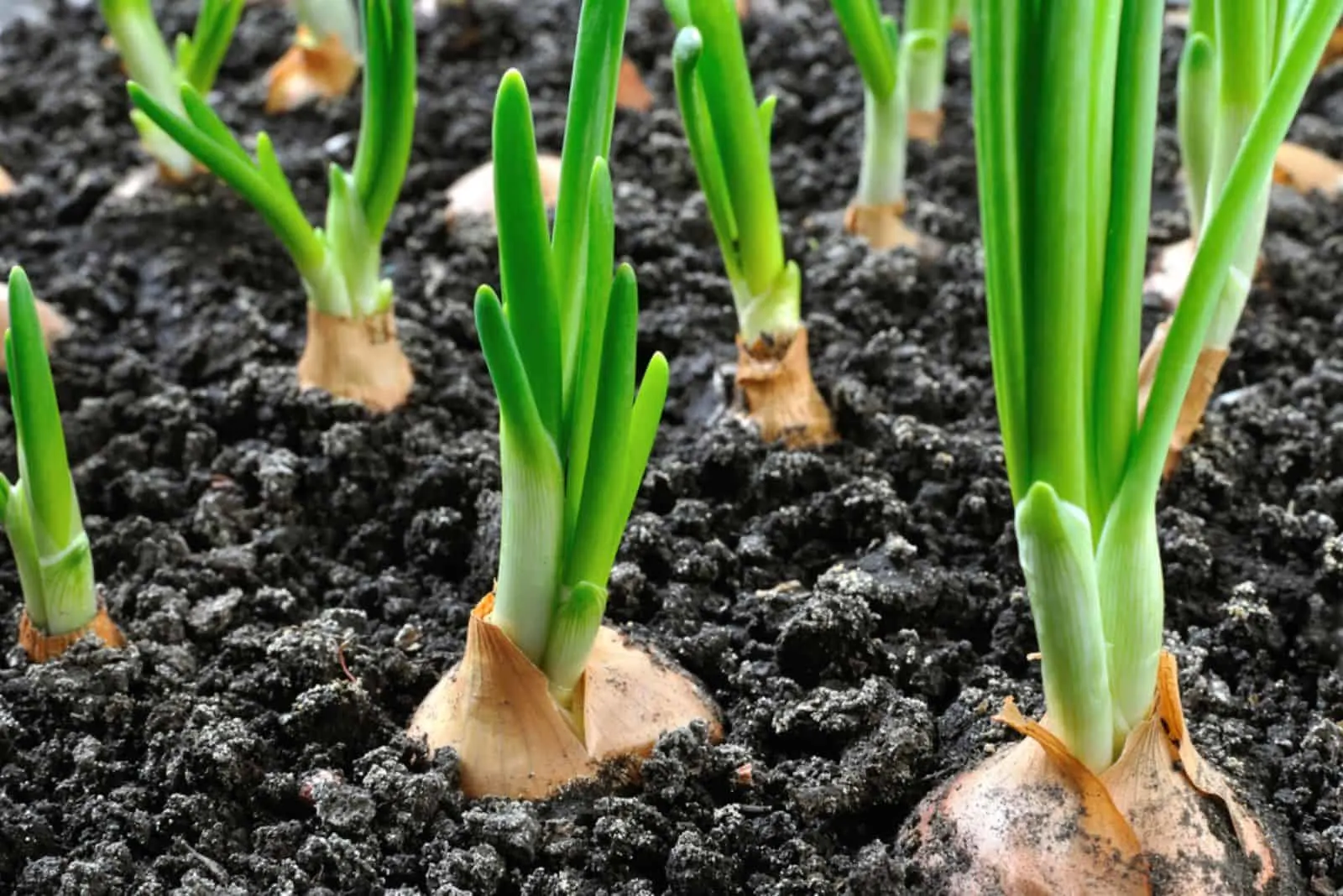
Tasty onions emit a pretty strong fragrance, and I assure you no snake will come close to them. It’s a long-lasting and incredibly popular crop that is significant in cuisine around the world.
Here’s some basic info about this Allium plant!
[table id=560 /]
I kinda understand snakes when it comes to onions and their scent. I mean, I cry my eyes out every time I’m handling onions, so it’s no wonder animals are scared of it!
If snakes and unruly grazers are a problem in your garden, you can choose to grow a few rows of onions to safeguard your more delicate plant species.
Onions make excellent dill companion plants. The smell of the Allium cepa plant will prevent Japanese beetle infestation in your outdoor garden.
Nutrient-rich soil mixes and full sun will help onions go through their growth stages.
You can encourage onion root growth by deep watering during the growing season.
15. Yucca
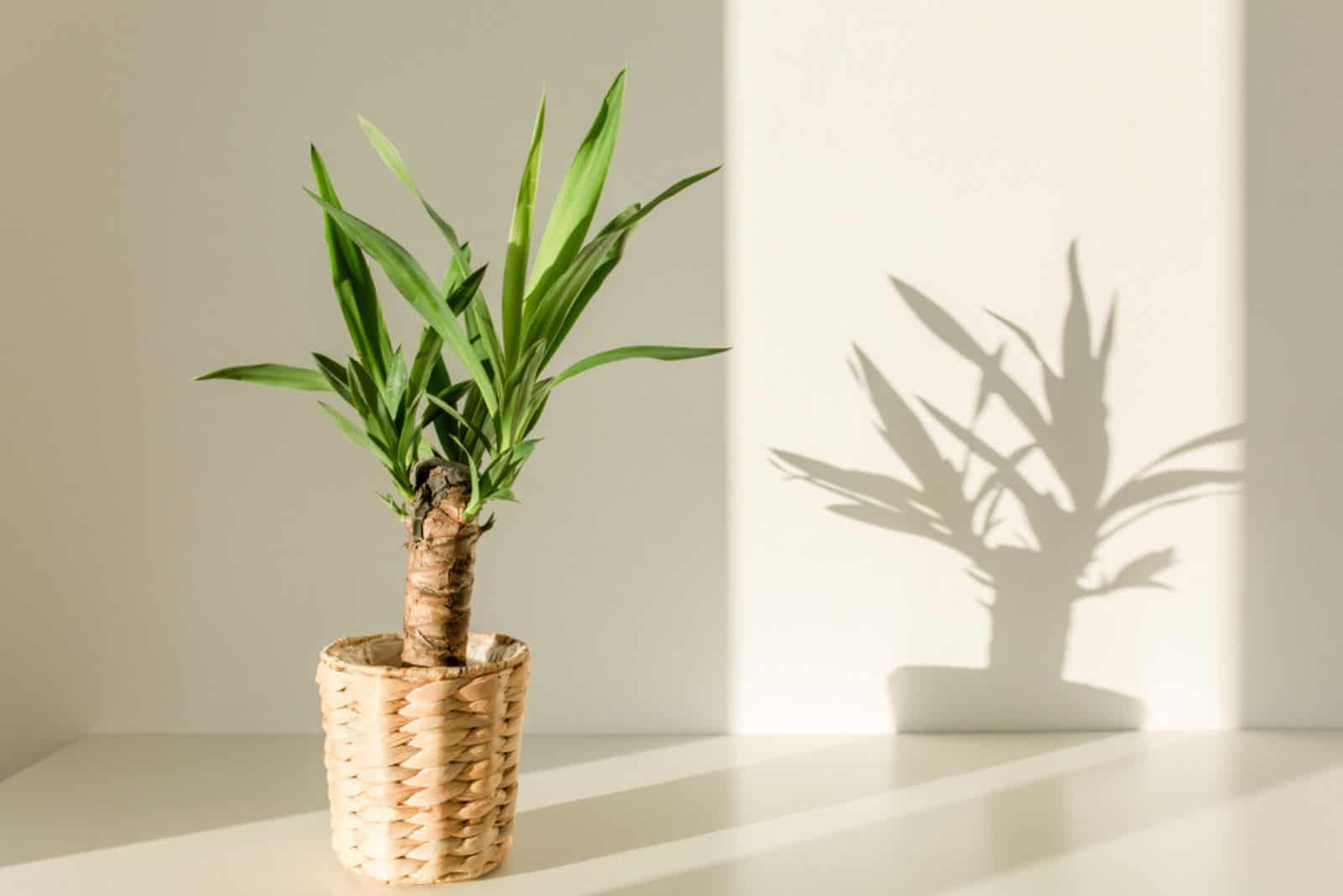
Yucca plants produce sharp leaves which keep snakes at bay. In the past, yucca, or Adam’s needle, have been predominantly grown as decorative plants in gardens. Still, it’s becoming more and more popular as a snake deterrent.
Here’s some basic info about the yucca plant.
[table id=561 /]
Yucca plants produce lovely white flowers, but the sharp leaves are their main advantage, at least when it comes to snakes.
Many species from the Yucca genus, such as red yucca, make excellent companion plants.
Yucca has been a part of traditional medicine for a long time due to its anti-inflammatory properties.
16. Garlic Plants
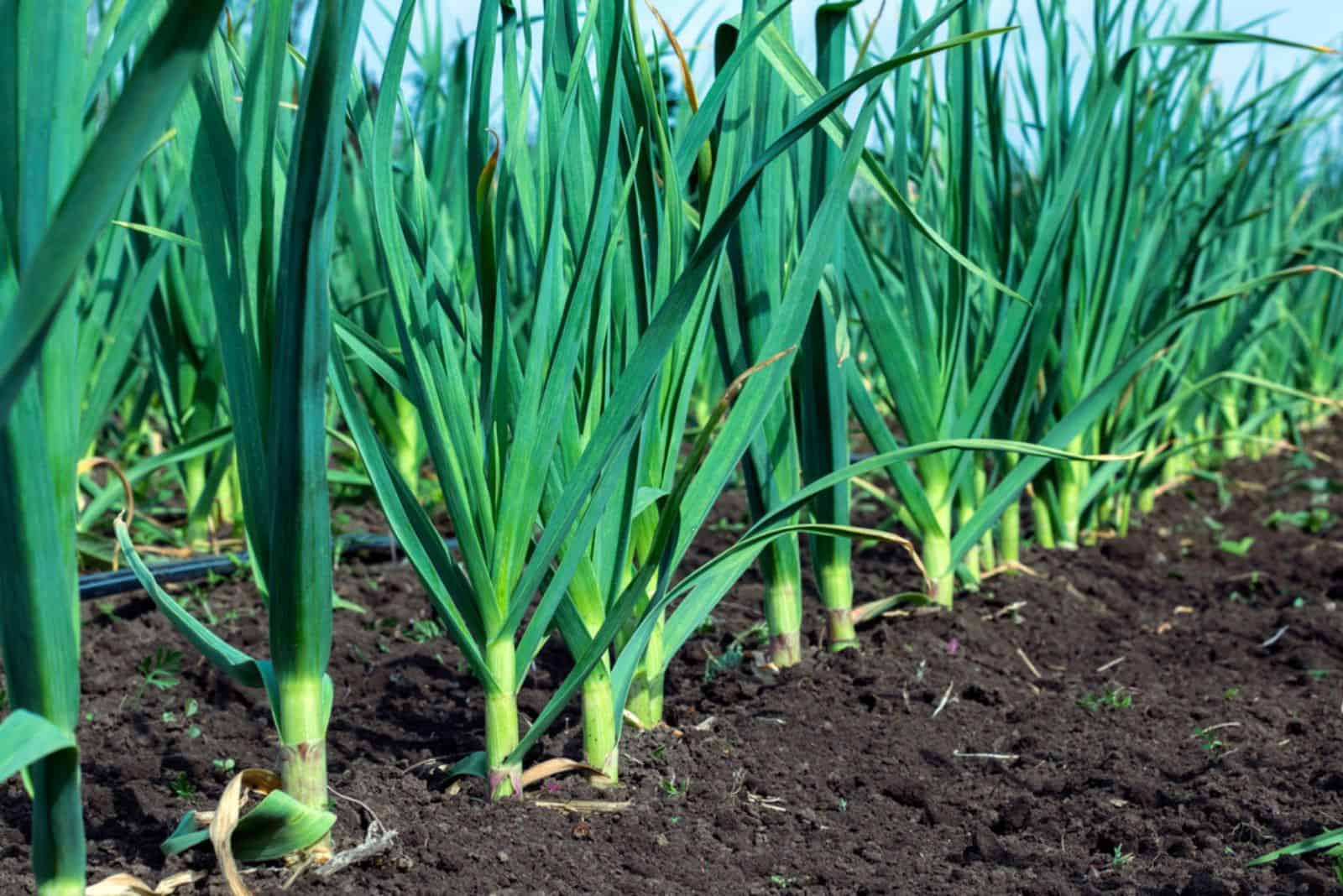
We’ll finish off the list with one more excellent snake-repellent plant. Garlic plants are primarily known for their strong smell, and even though they cause bad breath, their benefits prevail!
Here’s some basic info about garlic plants.
[table id=562 /]
Garlic is a popular seasoning that is well-known for its potent smell and the distinctive flavor it adds to food. It is mostly produced for its bulbs, which have significant sulfuric chemical content.
These are what create the potent scent that emanates from the bulbs whenever their surface is scraped. Harvesting garlic scapes may be kinda unpleasant but bear in mind that many dangerous animals, including snakes, can be deterred by the smell.
There’s one thing you should pay attention to if using garlic plants as snake repellents. The potent scent emits when you scratch the surface of the plant, so you’ll need to crush the cloves and place them all over your property.
Other Ways To Keep Snakes At Bay
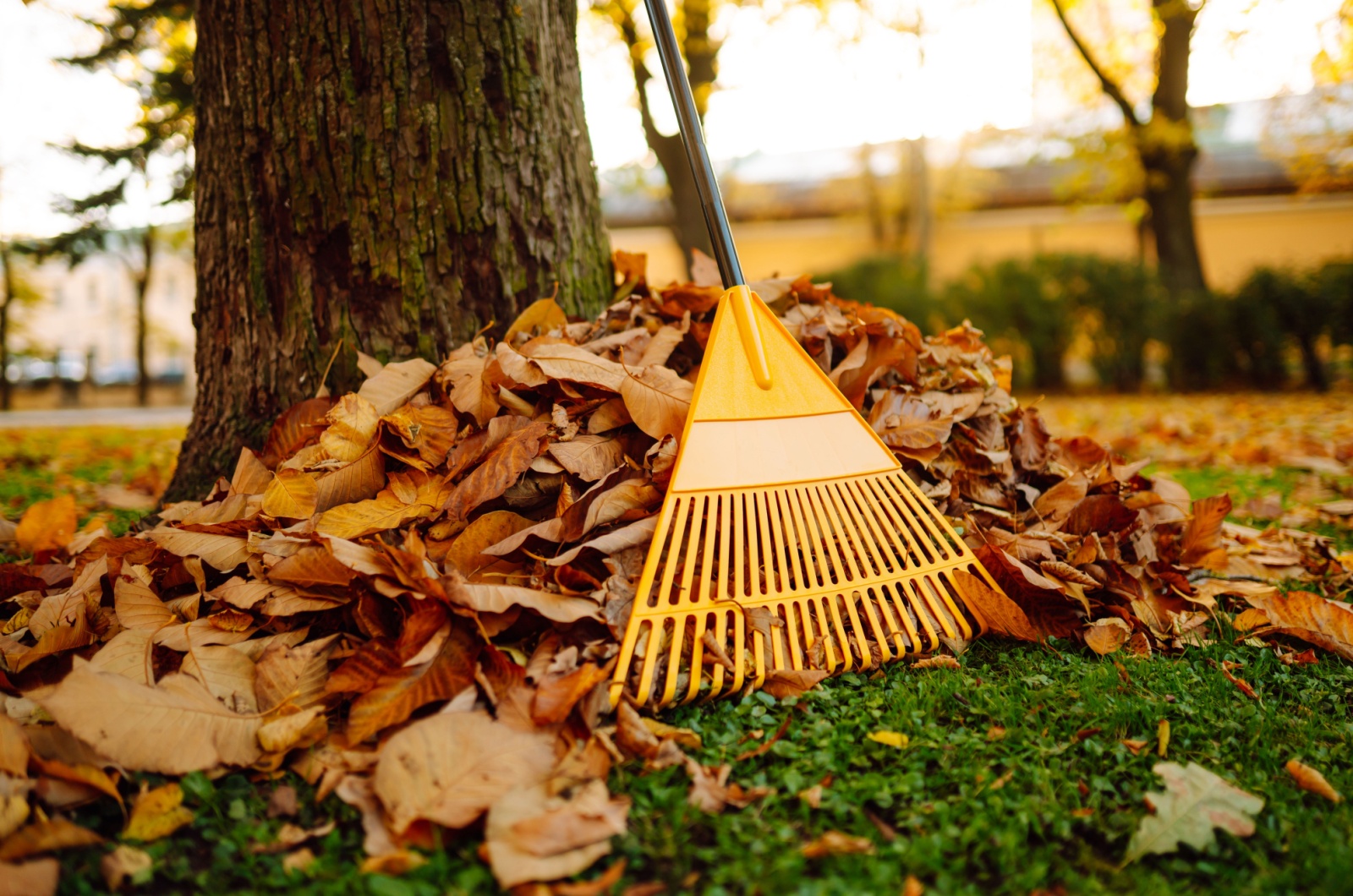
We’ve seen the power of plants in the battle with snakes, but there are some other ways to deter snakes from your property.
1. Trim your shrubs lower and prune tall grass.
2. Clear up logs, leaves piles, and debris.
3. Get rid of any moist areas in your yard (puddles and ponds)
4. Fill in burrows with soil.
5. Free-ranging dogs and cats might discourage snakes from settling down, which is another fantastic strategy to keep them away from your home. So, feed these lovely animals, and they’ll pay you back (as always).
Wrapping Up
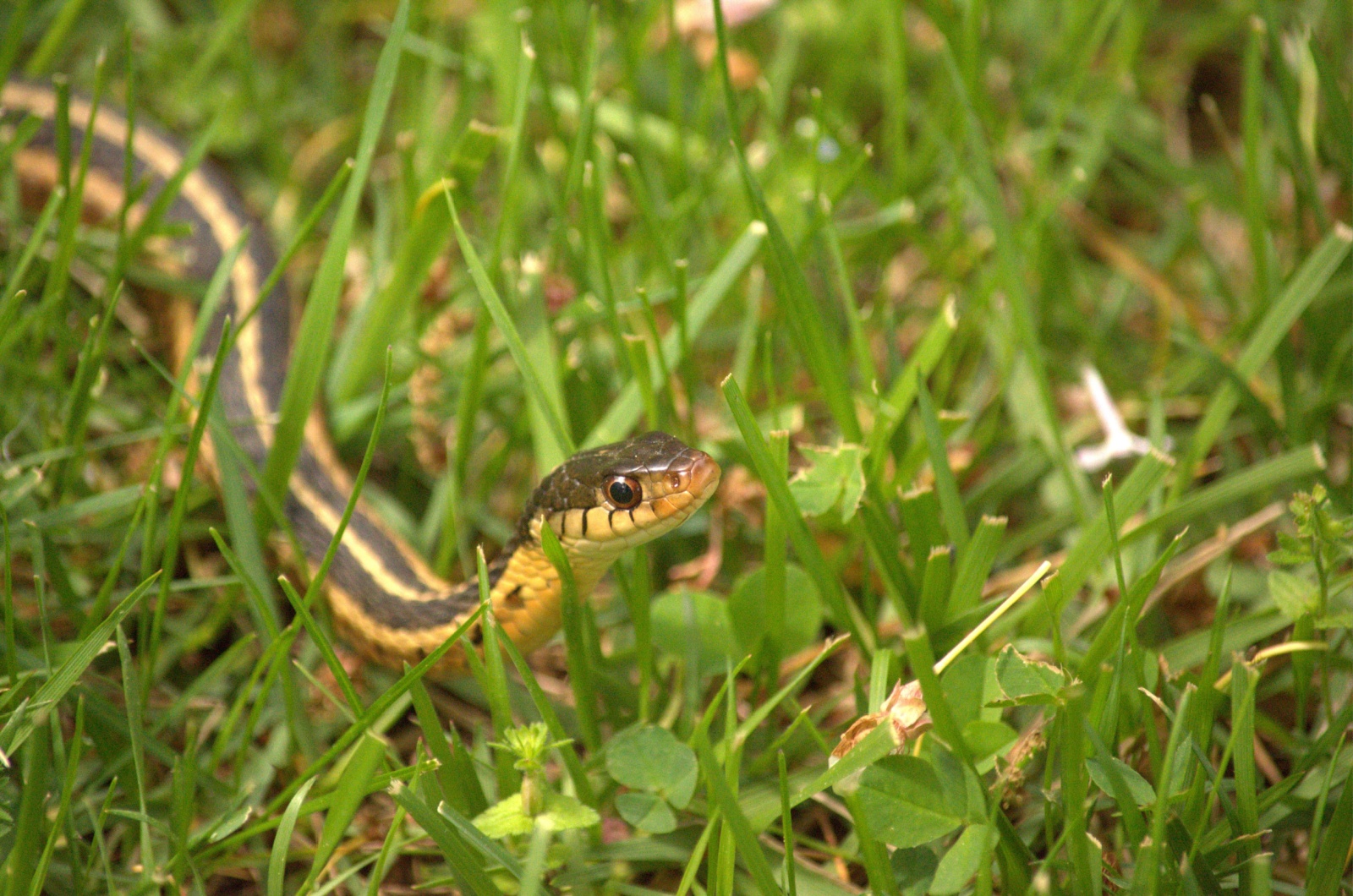
I don’t even need to tell you how dangerous snakes can be. It’s true that many of them aren’t poisonous, but you never know!
So, it’s better to keep them away by growing some snake-repellent plants! The plants listed above are easy to maintain and will make an attractive addition to your outdoor garden.
Until next time!
Like this post? Share or pin it for later!
